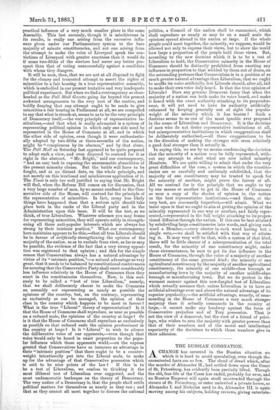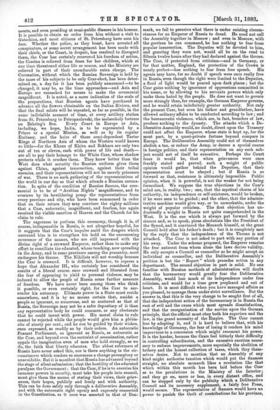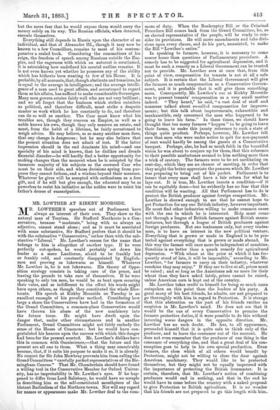THE RUSSIAN CORONATION.
ACHANGE has occurred in the Russian situation on which it is hard to avoid speculating, even though the uncontested facts are so few. The cloud of dread which, after the murder of Alexander II., had settled down upon the Court of St. Petersburg, has evidently been partially lifted. Though the old, free life of the Czars has ended, probably for ever, and no Russian Emperor will again stroll unattended through the streets of St. Petersburg, or enter uninvited a private house, as Alexander I. and Nicholas used to do, Alexander III. is again moving among his subjects, holding reviews, giving entertain- =onto, and even presiding at semi-public dinners in his honour. it is possible to obtain an order from him without a visit to Gatschina, and most citizens of St. Petersburg have seen his face. Whether the police, as they boast, have arrested all conspirators, or some secret arrangement has been made with their chiefs, or the Court, in despair, has resolved to disregard them the Czar has certainly recovered his freedom of action, the them, is relieved from fears for her children which at one time threatened either life or reason, and the children, are relieved in part of their unendurable extra charge. The Coronation, without which the Russian Sovereign is held by the mass of his subjects to be only Czar-elect, has been deter- mined on, a day for it has been publicly announced—to be .changed, it may be, as the time approaches—and Asia and Europe are ransacked for means to make the ceremonial magnificent. It is noted, as a mere indication of the scale of -the preparations that Russian agents have purchased in advance all the preparations, obtainable on the Italian Riviera, and that the final salute will be repeated, so far as possible, in the same indivisible moment of time, at every artillery station from St. Petersburg to Petropaulovski, the melancholy fortress on Behring's Sea. Every Court in Europe or Asia, including, we hope, India, is to be represented by a Prince or a special Mission, as well as by its regular ,Embassy, and the heirs of those semi-dependent Tartar Kings of Northern Asia of whom the Western world knows so little—for the Khans of Khiva and Bokhara are only two out of ten or eleven, each with power of life and death— are all to pay their homage to the White Czar, whose shadow protects while it crushes them. They know better than the West does what security the Russian uniform gives them against China, against insurrection, against their tribal enemies, and their representatives will not be merely prisoners of war. There is no such gathering of the representatives of the world in our day as that which attends a Russian corona- tion. In spite of the condition of Russian finance, the cere- monial is to be of "Arabian Nights" magnificence, and to overawe by its bewildering pomp the representatives from every province and city, who have been summoned in order that on their return they may convince the eighty millions that a Czar, autocratic, magnificent, and fearless, has again received the visible sanction of Heaven and the Church for his claim to rule.
The eagerness to perform this ceremony, though it is, of course, indispensable in Russia, is not altogether hopeful, for it suggests that the Czar's impulse amid the dangers which .surround him is to strengthen his hold on the unreasoning reverence of the masses, who are still impressed with the divine right of a crowned Emperor, rather than to make any effort to conciliate the educated, whose teaching, now spreading the Army, and in some provinces among the peasantry, most endangers his throne. The Nihilists will not worship because the Czar is crowned. It is difficult, however, to repress a hope that Alexander HI, who certainly has considered the results of a liberal course, once crowned and liberated from the fear of appearing to yield to personal violence, may be induced to allow the people of Russia some further measure of freedom. We have never been among those who think it possible, or even certainly right, for the Czar to sur- render his autocracy. Ultimate power in a State must reside somewhere, and it is by no means certain that, amidst a people so ignorant, so numerous, and so scattered as that of Russia, the Sovereign may not be a safer depositary of it than any representative body he could summon, or any electorate that he could invest with power. His moral claim to rule cannot be rejected while the people would give him a plebis- cite of ninety per cent., and he can be guided by their wishes, once expressed, as readily as by their orders. An autocratic _Peasant Parliament, as ignorant as Russia, as autocratic as the Czar, and beyond even the restraint of assassination, rather appals the imagination even of men who hold strongly, as we do, the faith that liberty educates. The ablest reformers of Russia have never asked this, nor is there anything in the cir- oumstances which renders so enormous a change peremptory or unavoidable. But it is manifest that Russia has advanced beyond the stage of silent submission; that the hostility of the educated ;paralyses the Government ; that the Czar, if he is to exercise his immense powers in security, must take his people into council, must give them the means of stating their views, their griev- ances, their hopes, publicly and freely and with authority. This can be done safely only through a deliberative Assembly, and with the autocratic right openly and expressly reasserted in the Constitution, as it once was asserted in that of Den- mark, we fail to perceive what there is under existing circum- stances for an Emperor of Russia to dread. He need not call the Assembly together in Moscow ; and even in Moscow, with the garrison he can command, he has nothing to fear from popular insurrection. The Deputies will be devoted to him, and granting they were not, would all be on the road to Siberia twelve hours after they had declared against the throne. The Czar, if protected from criticism—and in Germany, or for that matter, England, the protection of the Crown is nearly perfect—has nothing to fear from free speech. His agents may have, for no doubt if speech were once really free in Russia, even though the right were limited to the Deputies, a flood of light would be poured upon dark places ; but the Czar gains nothing by ignorance of oppressions committed in his name, or by allowing to his servants powers which only make them hated by the people. He does not want to govern more strongly than, for example, the German Emperor governs, and he would retain indefinitely greater authority. Not only the present Czar, but even his father and grandfather, have allowed ordinary affairs to be conducted according to law ; and the bureaucratic violences, which are, in fact, breaches of law, produce nothing to the dynasty. The attacks which a De- liberative Assembly would, no doubt, direct upon the Treasury could not affect the Emperor, whose state is kept up, for the most part, by a quasi-private fortune beyond compare in Europe. The Deliberative Assembly could not of themselves abolish a tax, or reduce the Army, or decree a special course in foreign politics, and their representation on any such sub- ject would not of itself be executive. Perhaps the Court fears it would be, that when grievances were once frankly stated and proved, sue/a a weight of public opinion would gather behind the Deputies, that their representation must be obeyed ; but if Russia is so forward as that, resistance is ultimately impossible. Public opinion, when it is powerful, is not the weaker for not being formulised. We suppose the true objections in the Czar's mind are, in reality, two ; one, that the mystical charm of his authority, its independence or self-existence, would be broken, if he were seen to be guided ; and the other, that the adminis- trative machine would give way, or be unworkable, under the weight of popular criticism. The first objection has un- doubtedly a weight in Russia not quite comprehended in the West. It is the one which is always put forward by the sincere and, so to speak, pious absolutists like the President of the Synod, and it convinced the Monarch himself, at the great Council held after his father's death ; but it is completely met by the reply that the independence of the Throne is not attacked. The Czar is not asked to part with any portion of his sway. Under the scheme proposed, the Emperor remains the free autocrat from whom alone the laws derive validity. He only accepts a Council as counsellor as he might accept an individual as counsellor, and the Deliberative Assembly's petition is but the " Report " which precedes action in any department. The second objection in part is solid. No one familiar with Russian methods of administration will doubt that the bureaucracy would greatly fear the Deliberative Assembly, would lose much of its independence under free criticism, and would for a time grow perplexed and out of heart. It is most difficult when you have managed affairs as you pleased, to manage them under strict surveillance. But the answer is, that this is the very change to be sought first of all, that the independent action of the bureaucracy is in Russia the root of evil and the cause which most spreads dissatisfaction, and that the reorganisation of the service upon the German principle, that the official must obey both his superiors and the law, is the grand necessity of the Empire. The Czar cannot lose by adopting it, and it is hard to believe that, with his knowledge of Germany, the fear of losing it renders his mind impervious to a concession which might recement his power. It is the harder, because the Czars feel bitterly their difficulty in controlling subordinates, and the excessive exertion neces- sary to enforce improvements, more especially the abolition of bribery and the honest collection of taxes, which they them- selves desire. Not to mention that an Assembly of any kind might authorise taxation which would put the finances straight, no absolute monarch likes a revelation like that which within this month has been laid before the Czar as to the peculations in the Ministry of the Interior; and they go on, more or less, in every distant office, and can be stopped only by the publicity which a Deliberative Council and its necessary supplement, a fairly free Press, would secure. The representative of Samara would have no power to punish the theft of contributions for his province,
but the mere fear that he would expose them would carry the money safely on its way. The Russian officials, when detected, execute themselves.
Everything still depends in Russia upon the character of an individual, and that of Alexander III, though it may now be known to a few Councillors, remains to most of his contem- poraries a sealed book. Considering the commotions of his reign, the freedom of speech among Russians outside the Em- pire, and the eagerness with which an autocrat is scrutinised, it is astonishing how undefined his mental outline remains. It is not even known yet whether he possesses any of the ability which has hitherto been wanting to few of his House. It is probable, by all accounts, that, though obstinate and tenacious, he is equal to the average in intelligence; and the average intelli- gence of a man used to great affairs, and accustomed to regard them as his affairs, has sufficed to make considerable Sovereigns. Many men govern estates fairly well who are not very brilliant ; and we all forget that the business which strikes outsiders as political, and therefore difficult, must strike a despotic master as work which he has constantly to do, and therefore can do as well as another. The Czar must know what his troubles are, though they concern an Empire, as well as a noble knows his own, though they only concern an estate, and must, from the habit of a lifetime, be fairly accustomed to weigh advice. He may believe, as so many another man does, that any change is dangerous ; but he may also believe that the present situation does not admit of rest. If the latter impression should in the end dominate his mind—and one specialty of his mind is known, that he dislikes and dreads financial disorder—he will hardly find a better opportunity for making changes than the moment when he is accepted by the immense majority of his subjects as the crowned Czar who must be on their side, and whose decisions spring from pur- poses they cannot fathom, and a wisdom beyond their measure. Whatever he gives will be accepted with enthusiasm as a free gift, and if he will but give enough, the educated may be as powerless to resist his initiative as the nobles were to resist his father's decree of emancipation.




































 Previous page
Previous page